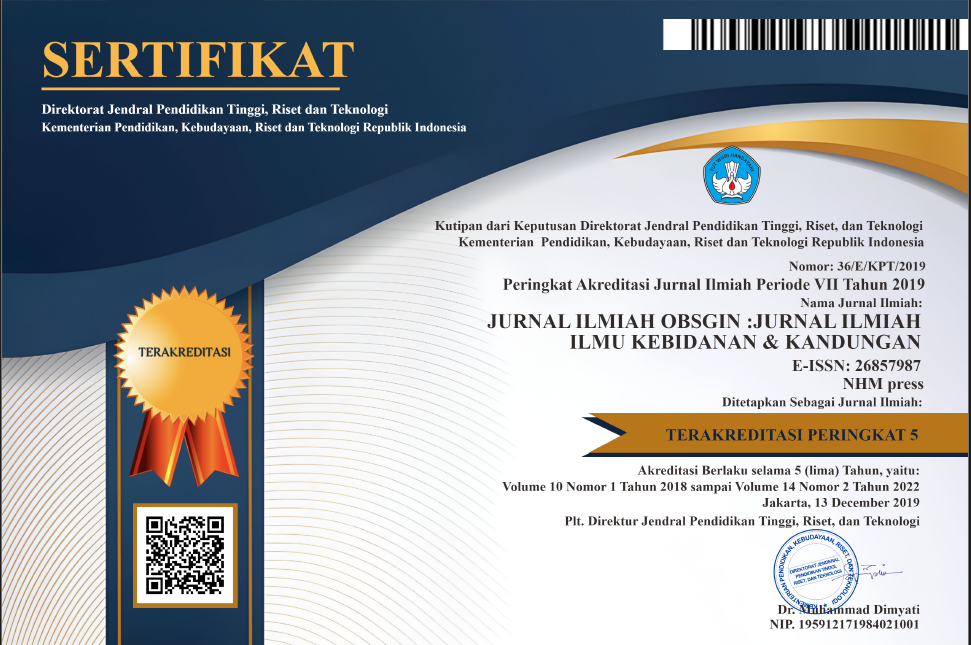HUBUNGAN TANGIBLES DAN RELIABILITY PETUGAS DENGAN TINGKAT KEPUASAN AKSEPTOR KB MKJP
Abstract
The Reproductive Health Program is expected to improve the health and welfare of mothers, children and families. Based on an initial survey of 10 family planning acceptors, the results showed that 70% of family planning acceptors were dissatisfied with the services provided by Simpang Limbur Health Center health workers. Related to acceptor dissatisfaction due to limited space and time as well as lack of communication from midwives in explaining contraception. This study aims to determine the relationship between customer service and officer reliability with the level of satisfaction of MKJP contraceptive acceptors. This research is an analytical research with a cross sectional research design. The population is 105 MKJP family planning acceptors. The sample was 56 respondents. The instrument used was a questionnaire sheet. Data were analyzed using the Chi Square Test. The research was carried out from 1 to 12 July 2022 in Pinang Merah Village, Simpang Limbur Health Center Working Area, West Pamenang District. The results of the research show that there is a relationship between physical evidence and MKJP family planning acceptor satisfaction (p = 0.000), and there is a relationship between reliability and acceptor satisfaction with a value of p = 0.000. Service quality has a close relationship with acceptor satisfaction because service quality provides an encouragement to acceptors to establish strong relationships with the Community Health Center. As society's demands for quality health services increase, service functions need to be improved to provide acceptor satisfaction.
References
Dwi Wulansary, M. (2019). Hubungan Pemakaian kb suntik 3 bulan dengan kecukupan asi eksklusif pada ibu yang mempunyai anak 7-23 bulan di PMB Palangka Raya. POLTEKKES KEMKES PALANGKARAYA.
Handayani, B., & Rahmawati, N. I. (2016). Tingkat Pendidikan PUS Berhubungan dengan Pemilihan Jenis Alat Kontrasepsi tetapi Tidak Berhubungan dengan Keikutsertaan KB di Desa Argomulyo, Sedayu, Bantul, Yogyakarta. JNKI (Jurnal Ners Dan Kebidanan Indonesia)(Indonesian Journal of Nursing and Midwifery), 4(1), 11–18.
Isnaini, Y. N., Setyaningsih, R. D., & Wibowo, T. H. (2014). Hubungan Kualitas Pelayanan Kontrasepsi Dengan Tingkat Kepuasan Akseptor KB. Viva Medika: Jurnal Kesehatan, Kebidanan Dan Keperawatan, 7(1).
Jasa, N. E., Listiana, A., & Risneni, R. (2021). Paritas, Pekerjaan Dan Pendidikan Berhubungan Dengan Pemilihan Alat Kontrasepsi MKJP Pada Akseptor KB. Jurnal Kebidanan Malahayati, 7(4), 744–750.
Koba, M. T. E., Mado, F. G., & Kenjam, Y. (2019). Hubungan Tingkat Pengetahuan Akseptor Keluarga Berencana dan Peran Tenaga Kesehatan dengan Minat Penggunaan Kontrasepsi Jangka Panjang (MKJP). Media Kesehatan Masyarakat, 1(1), 1–7.
Mulyani, H., & Purwati, Y. (2017). Pengaruh konseling kontrasepsi terhadap minat pemilihan mkjp iud di puskesmas gamping I sleman. Universitas’ Aisyiyah Yogyakarta.
Putri, F., Katmawanti, S., & Fanani, E. (2022). Hubungan penggunaan KB dengan pemberian ASI eksklusif di Indonesia (Analisis data SDKI tahun 2017). Sport Science and Health, 4(1), 12–23.
Shaliha, F., & Puspitasari, N. (2022). Pengaruh kualitas pelayanan konseling pranikah dan pemahaman materi keluarga berencana terhadap sikap calon pengantin dalam menggunakan alat kontrasepsi di kecamatan sempu, banyuwangi. Promotif: Jurnal Kesehatan Masyarakat, 12(2), 191–200.
Sidabukke, I., & Siahaan, J. M. (2021). Hubungan Pengetahuan dan Kualitas Pelayanan KB dengan Pemilihan Metode Kontrasepsi Jangka Panjang (MKJP) di Klinik Kesuma Bangsa Kecamatan Perbaungan Tahun 2020. Jurnal Teknologi Kesehatan Dan Ilmu Sosial (Tekesnos), 3(1), 278–285.
Siswanto, R., & Farich, A. (2015). Faktor pemilihan metode kontrasepsi jangka panjang (MKJP) pada pasangan usia subur (PUS) di wilayah kerja puskesmas segala mider Kota Bandar Lampung. Jurnal Dunia Kesmas, 4(3).











